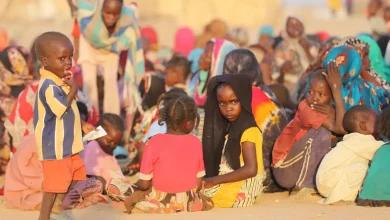
On Tuesday, the United Nations issued a stark warning that children in Khartoum are starving to the point of becoming “skin and bones,” and that thousands of families trapped in the besieged city of El Fasher, western Sudan, are at risk of dying from hunger.
The war in Sudan, which erupted in mid-April 2023 between the army led by Abdel Fattah al-Burhan and the Rapid Support Forces (RSF) led by his former ally Mohamed Hamdan Dagalo (Hemedti), has killed tens of thousands and displaced millions.
Malnutrition Crisis
In Khartoum State, “malnutrition is hitting hard, and many children are now just skin and bones,” said Sheldon Yett, UNICEF Representative in Sudan, which the UN describes as the “world’s worst humanitarian crisis.” Around 25 million people are currently facing acute food insecurity.
Ordeal of the El Fasher Siege
In El Fasher, the capital of North Darfur—besieged by RSF forces and located 1,000 kilometers west of the capital—thousands of people are facing an imminent famine, according to the World Food Programme (WFP).
“Everyone in the city is struggling daily to survive,” said Michael Dunford, WFP’s Regional Director for Eastern and Southern Africa, noting that “resilience has collapsed completely after more than two years of war, and lives will be lost without immediate and sustained access to essential resources.”
El Fasher, which has been under RSF siege since May 2024, remains the only Darfur state capital still under army control.
Soaring Food Prices
WFP also reported a sharp rise in prices for staple foods in the city. Sorghum and wheat—used to make bread and porridge—are now over 460% more expensive in El Fasher.
Markets are nearly empty, and most communal kitchens have shut down.
A year ago, famine was declared in the displacement camps around El Fasher.
Difficulties Delivering Aid
No official famine declaration has been made within El Fasher itself due to the lack of reliable data, but the UN has warned that famine is likely spreading.
“Despite months of effort, we have not been able to monitor the dire situation in El Fasher, nor deliver supplies,” Yett told journalists in Geneva.
In June, five humanitarian workers were killed in an attack on a UN convoy en route to the city.
Some families have resorted to eating animal fodder or waste, while child malnutrition rates have reached alarming levels.
Children’s Suffering
According to WFP, nearly 40% of children under five are suffering from acute malnutrition, with 11% severely malnourished.
Since the army retook control of Khartoum in March, RSF forces have intensified attacks on El Fasher and nearby refugee camps in an attempt to solidify control over the region, large parts of which they already dominate.
In April, an attack on Zamzam Camp caused a mass displacement of civilians toward El Fasher and the town of Tawila, both now grappling with a cholera outbreak.
Though relative calm has returned to Khartoum, children there still have only “limited but increasing access to drinking water, food, care, and education,” according to Yett.
Severe Deterioration
UNICEF reports that the majority of malnutrition cases in Khartoum State—37%—are concentrated in two of its seven cities: the capital itself and Jabal Awliya.
“War has destroyed civilian life in Sudan and turned survival into a daily ordeal,” said Radhouane Nouicer, the UN’s Independent Expert on Human Rights in Sudan.
He noted that humanitarian and human rights conditions are deteriorating at an alarming rate, with both warring parties accused of targeting civilians, randomly shelling populated areas, and blocking humanitarian aid.
Sheldon Yett concluded: “Children are dying from hunger, disease, and direct violence.”




